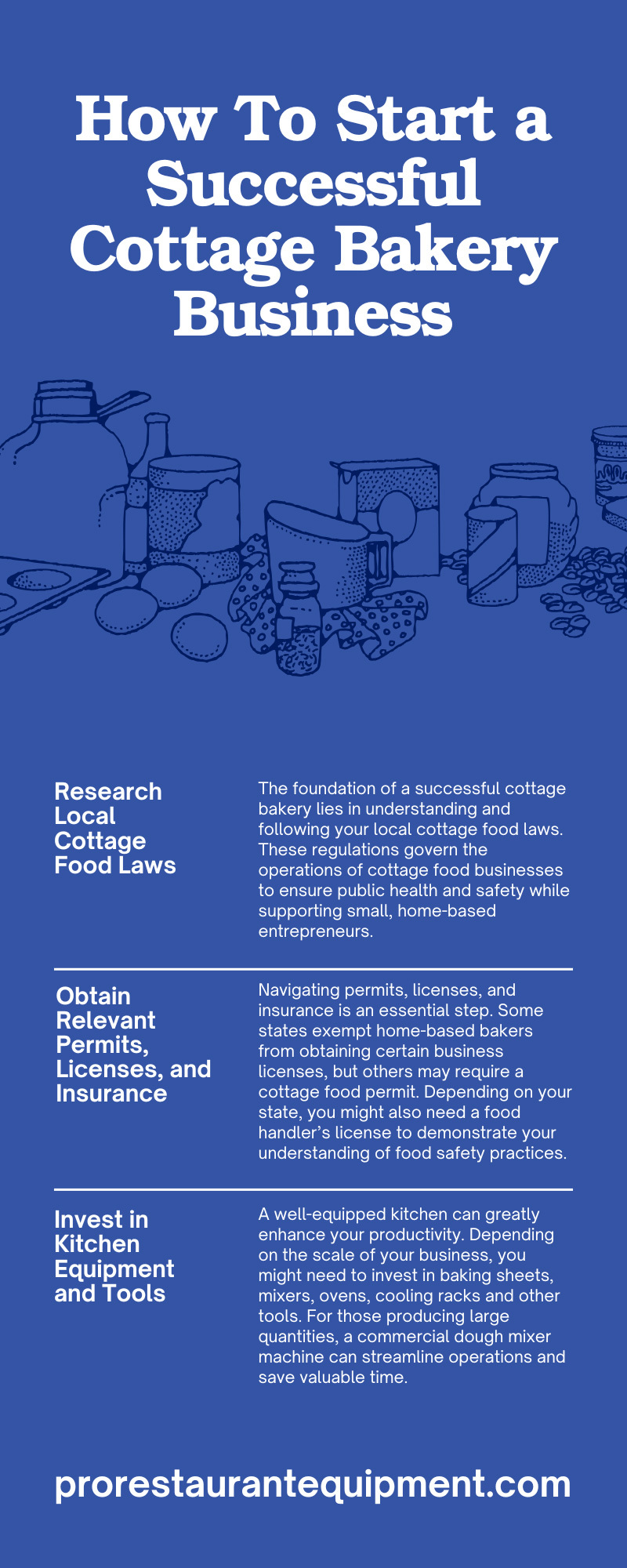Jun 23rd 2025
How To Start a Successful Cottage Bakery Business
Starting a cottage bakery business can be an excellent way to turn your passion for baking into a fulfilling livelihood. A cottage bakery allows entrepreneurs to sell homemade baked goods directly from their kitchens, providing an affordable entry into the world of bakery ownership. However, building a successful cottage bakery involves more than just mastering your craft. This guide will take you through every essential step to help you establish and grow your cottage bakery business.
Research Local Cottage Food Laws
The foundation of a successful cottage bakery lies in understanding and following your local cottage food laws. These regulations govern the operations of cottage food businesses to ensure public health and safety while supporting small, home-based entrepreneurs. Cottage food laws vary significantly across the country, so it is important to familiarize yourself with your area’s specific requirements.
Legal Goods To Sell
Often, cottage food laws restrict home bakers to selling low-risk, non-perishable goods that do not require refrigeration. Examples of typically approved items include cookies, bread, muffins, cakes, and pies. However, certain products, such as meat-based pies, custards, and other high-moisture foods, are prohibited due to food safety concerns. Always verify that the items you plan to offer comply with local regulations.
Food Labeling Requirements
Proper food labeling is another essential aspect of operating a cottage bakery. Labels must include a comprehensive list of ingredients, highlighting allergens such as nuts, dairy, or gluten. Additionally, you may need to include a statement that your food was prepared in a home kitchen.
Food Preparation Regulations
Regulations exist concerning how bakers should prepare food in home kitchens. Common requirements include maintaining a clean workspace, separating food preparation from other household activities, and using proper storage practices. Some states may even require home inspections to certify that your kitchen meets health and safety standards.
Limits on Sales
Cottage bakery businesses are sometimes subject to annual revenue caps or restrictions on where bakers can sell their homemade products. Many states limit the total sales a cottage food operator can make to ensure operations remain small-scale. Additionally, there can be restrictions on selling across state lines or selling to commercial retailers.
Create a Business Plan
A comprehensive business plan serves as your blueprint for success. It gives your ideas structure and positions you to act with intention as you launch your venture. Read on to learn four key components of a business plan to start a successful cottage bakery business.
Bakery Name and Branding
Your bakery’s name and branding reflect your business’s personality. Choose a name that resonates with your audience and aligns with your product focus. A cohesive brand identity, including a logo and consistent design elements, makes your business more memorable and professional.
Products and Services Offered
Specifying the range of products you plan to offer is key to positioning your business. Defining your services clearly communicates your value to potential customers, whether you offer custom orders or delivery. Specializing in a niche, such as gluten-free or vegan options, can help you stand out in the market.
Logistics and Operations
Your bakery requires a clear plan for day-to-day operations. Decide how you’ll handle ordering, production, and customer interactions. Creating a streamlined workflow keeps you efficient, enabling you to focus on delivering exceptional products and growing your business.
Finances and Projections
Determine how much funding you need to launch your cottage bakery by calculating a combination of start-up and ongoing variable and fixed expenses. Draft financial projections to stay on track and measure profitability as your business grows.
Obtain Relevant Permits, Licenses, and Insurance
Navigating permits, licenses, and insurance is an essential step in successfully starting a cottage bakery business. Some states exempt home-based bakers from obtaining certain business licenses, but others may require a cottage food permit. Depending on your state, you might also need a food handler’s license to demonstrate your understanding of food safety practices.
These requirements vary widely between regions, so check with your local health department for clarification. Liability insurance is another safeguard worth considering, offering protection in case of customer claims related to your products.
Invest in Kitchen Equipment and Tools
A well-equipped kitchen can greatly enhance your productivity and ensure the quality of your baked goods. Depending on the scale of your business, you might need to invest in baking sheets, mixers, ovens, cooling racks and other tools. For those producing large quantities, a commercial dough mixer machine can streamline operations and save valuable time. Choosing durable and efficient kitchen equipment can help you maintain consistency and meet demand as your customer base increases.
Source Ingredients and Packaging Materials
The quality of your ingredients has a direct impact on the flavor and appeal of your products. Sourcing fresh, premium ingredients ensures the best results while reinforcing your brand reputation. Thoughtful packaging materials are equally important for aesthetic appeal and practicality. Packaging should protect your baked goods, clearly display required labels, and make a visual impression on your customers.
Strategically Price Your Baked Goods
Pricing your products effectively involves balancing affordability with profitability. Calculate the total cost of production, including ingredients, labor, and overhead, and factor in your desired profit margin. Researching competitors’ prices can also provide guidance on market expectations. Remember, your pricing should reflect the quality and value of your products while supporting your bakery’s growth. Strategic pricing ensures your bakery remains competitive while supporting sustainable growth.
Promote Yourself to Your Community
Building a loyal customer base begins with getting the word out. The way you promote yourself will depend on your location and how you plan to get your baked goods in front of customers. Effective ways to sell your cottage bakery items include hosting sales at your home, participating in local farmers’ markets and community events, and partnering with local shops.
Additionally, establish a strong online presence by creating a professional website and leveraging social media platforms. Sharing mouthwatering photos of your creations and engaging regularly with followers will help attract and retain customers.
Make Your Cottage Bakery a Sweet Success
The key to successfully starting a cottage bakery business is to combine your passion for baking with a solid business strategy. Following the steps outlined above ensures you establish a strong foundation for your business while staying compliant with local regulations. Partner with Pro Restaurant Equipment when you’re ready to turn your dream into reality. We offer commercial-grade kitchen equipment at competitive prices for restaurant and cottage bakery owners alike. Begin stocking your bakery kitchen today, and watch your community fall in love with your creations.


